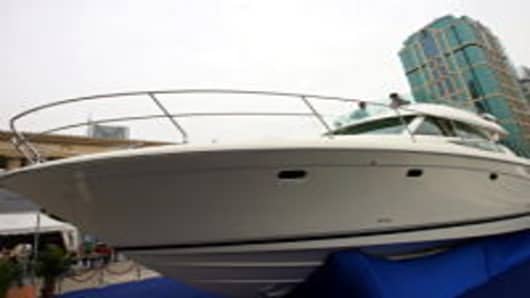The recreational boat industry is out of troubled waters, but the recovery has been spotty and uncertain—good news for bargain-hunting boat buyers.
After being slammed by the financial crisis, the industry bottomed out last year when boat sales hit a record low of 137,000, a 55 percent plunge from pre-2007 levels and down 14 percent from 2009.
Expectations of a 10 percent increase in sales this year have been tempered by rising gas prices as well as economic unease following the Japan earthquake. It could take at least two years before powerboat sales return to 2007 levels, experts say.
One sign of a recovery came during winter-long boat show season, where attendance—and sales—rose at many shows around the country. Some exhibitors saw sales increases of 50 to 70 percent from the previous year, according to the National Marine Manufacturers Association, the largest producer of boat shows.
“A few have reported boat show sales have returned to 2007 levels, but that was the exception and not the rule,” says Thom Dammrich, president of the NMMA.
While the vibe is better than last year, performance at the boat shows has still been hit-or-miss. Both dealers and manufacturers reported “real highs and real lows,” says Cathy Rick-Joule, vice president of NMMA boat shows.
Not surprisingly, the low end of the market—which includes smaller and affordable pontoon boats and fishing boats—has been strong. But there also are signs that pent-up demand for high-end yachts, which saw some softness during the downturn, is returning.
The midsized boat category remains weak, however. These boats are generally between 25- and 35-feet long and are priced between $100,000 and $300,000, says Larry Russo, CEO and president of Russo Marine, the largest powerboat dealer in Massachusetts.
Russo Marine was hit by losses after 2007, forcing it to slim down from six to three dealership locations. It returned to profitabilty in 2010.
The typical midsized boat buyer has been hurt by the mortgage crisis, which caused financing to dry up. “The borrower who is dependent on the home equity line of credit is largely absent in the market today,” says Dammrich.
Buyers also are finding it harder getting the same bargains that were available two years ago, when distress deals and repossessed boats flooded the market.
The industry, meanwhile, downsized during the recession, causing fewer boats to be built. Manufacturers also cut their dealer bases, causing the number of U.S. boat dealers to fall by 40 percent.
Brunswick , the world’s largest recreational boat builder, reduced its North American manufacturing footprint by closing 17 plants and doing away with eight boat brands after 2007.
But as the industry emerges from the recession, there are still some bargains for savvy boat buyers.
“Good deals still exist because the industry has been cost conscious,” says Rick-Joule, “We’re not out of woods yet.”
The average selling price is down 12 to 16 percent from three or four years ago, estimates Steve Tadd, the marketing director of Nautic Global, the fourth largest boat manufacturer in the U.S.
“We used to have more and more featured boats, more technology, more gadgets, more glitz,” says Andrew Graves, president of the Brunswick Boat Group during a recent meeting with investors during the Miami International Boat Show. “People wanted it and they would pay for it...In today's world, the consumer's opposite that.”
Questions? Comments? Email us at consumernation@cnbc.com


